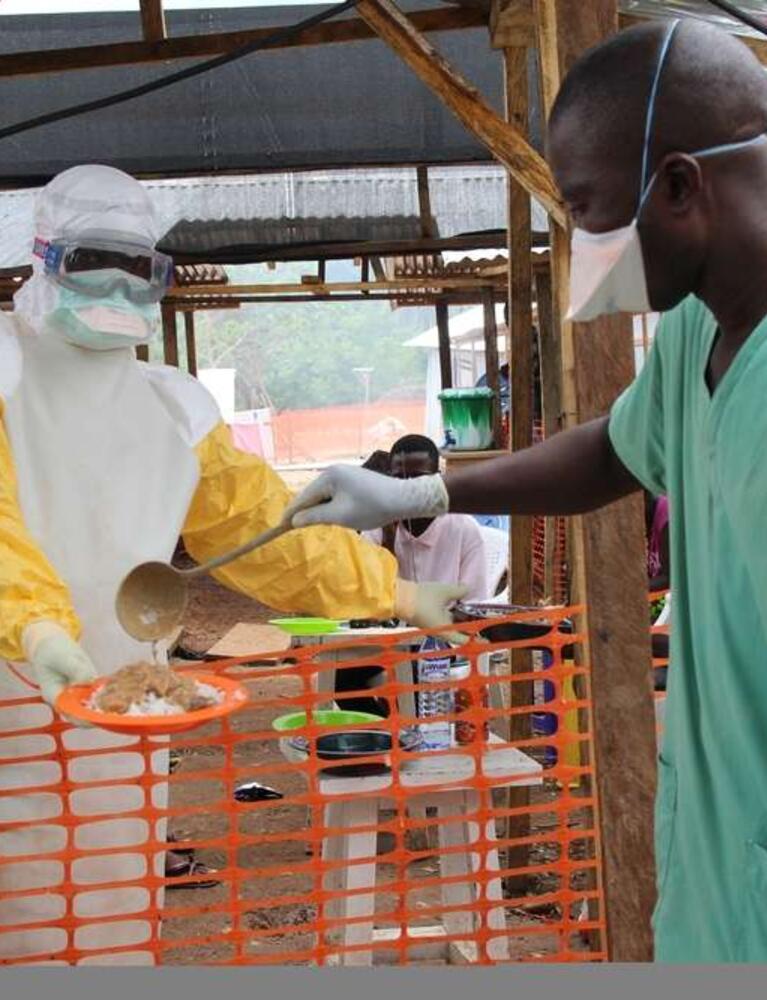Since the beginning of our operations in West Africa in March to combat the Ebola outbreak, Médecins Sans Frontières/Doctors Without Borders/Doctors Without Borders (MSF) have put in place stringent protocols to protect our staff from exposure to the Ebola virus and to monitor the health of returning staff.
MSF has specific guidelines and protocols for staff members returning from Ebola assignments. These guidelines govern the 21-day incubation period of the virus (it can take up to 21 days to display symptoms of possible Ebola infection).
A fever that develops during the 21-day period may also be due to something other than Ebola, such as the flu. A fever that develops after the 21-day-period is not due to Ebola.
MSF staff and Ebola
Until today, out of more than 700 expatriate staff deployed so far to West Africa, none has developed confirmed Ebola symptoms after returning to their home country. While some MSF staff members have been exposed in the field, those exposures were detected and the staff members were immediately isolated and treated.
Two international staff members have been medically evacuated. They have fully recovered.
MSF pre-identifies health facilities in the UK and Ireland that can assist and manage the care of our staff members in the event they develop symptoms after their return home. This pre-identification practice is carried out in coordination with Public Health England (PHE).
Upon return from the field, every MSF staff member goes through a thorough debriefing process, during which they are informed of our guidelines.
Ebola guidelines
Upon returning from the field, every MSF staff member goes through a thorough debriefing process, during which they are informed of our guidelines.
The guidelines include the following instructions:
- Check temperature two times per day
- Finish regular course of malaria prophylaxis (malaria symptoms can mimic Ebola symptoms)
- Be aware of relevant symptoms, such as fever
- Stay within four hours of a hospital with isolation facilities
- Immediately contact MSF office if any relevant symptoms develop
These guidelines are consistent with those provided by PHE to people returning from one of the Ebola-affected countries in West Africa. MSF is also implementing PHE guidelines outlining reporting requirements for people returning from Ebola affected countries.
Our colleague in New York followed the MSF protocols and guidelines since returning from West Africa. At the immediate detection of fever on the morning of 23 October, 2014, he swiftly notified the MSF office in New York. He did not leave his apartment until paramedics transported him safely to Bellevue Hospital in Manhattan, and he posed no public health threat prior to developing symptoms.
While MSF is not in a position to comment on his medical condition or the care he is receiving, the organisation sincerely wishes for his swift and complete recovery.
Ebola protection
These are the steps MSF takes to ensure the health and well being of its staff and the community at large:
- If returned staff members do not live within four hours of appropriate medical facilities, MSF will ensure they are accommodated appropriately during the 21-day incubation period.
- In the unlikely event that a staff member develops Ebola-like symptoms within the 21-day period, he/she is advised to immediately contact MSF and to refrain from traveling on public transport. Local health authorities are immediately notified.
- As long as a returned staff member does not experience any symptoms, normal life can proceed. Family, friends, and neighbours can be assured that a returned staff member who does not present symptoms is not contagious and does not put them at risk. Self-quarantine is neither warranted nor recommended when a person is not displaying Ebola-like symptoms.
However, returned staff members are discouraged from returning to work during the 21-day period. Field assignments are extremely challenging and people need to regain energy.
In addition, people who return to work too quickly could catch a simple bacterial or viral infection (common cold, bronchitis, flu etc.) that may have symptoms similar to Ebola. This can create needless stress and anxiety for the person involved and his/her colleagues. For this reason, MSF continues to provide salaries to returned staff for the 21-day period.






